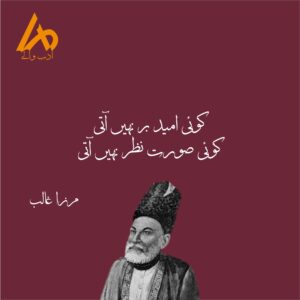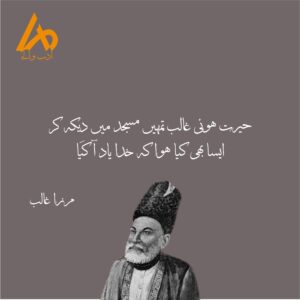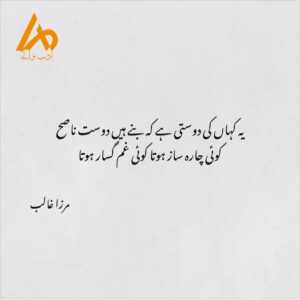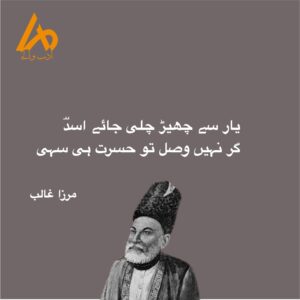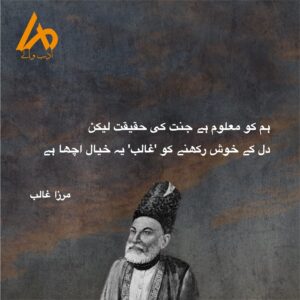Category: Mirza Ghalib
Mirza Ghalib: The Grand Master of Urdu Poetry
Mirza Ghalib, born Mirza Asadullah Baig Khan in 1797, stands as a colossus in the world of Urdu poetry. His life, marked by poetic brilliance and personal trials, has left an indelible mark on the literary landscape of South Asia. Ghalib is often hailed as the preeminent Urdu and Persian-language poet of the 19th century, and his ghazals continue to captivate readers with their profound philosophical insights and exquisite linguistic craftsmanship.
Ghalib’s poetry is a reflection of the tumultuous times he lived in, navigating the decline of the Mughal Empire and the advent of British colonial rule in India. His verses are a delicate dance between the classical and the modern, seamlessly blending traditional ghazal forms with a contemporary sensibility. Ghalib’s ghazals delve into the complexities of love, spirituality, existentialism, and the ephemeral nature of life.
One of the hallmarks of Ghalib’s poetry is his mastery of language. His verses are a testament to the richness and flexibility of Urdu and Persian, displaying a remarkable command over metaphor, simile, and wordplay. Ghalib’s ghazals are not merely lyrical expressions but profound philosophical inquiries into the nature of the self and the universe.
In the realm of love poetry, Ghalib’s contributions are unparalleled. His exploration of love goes beyond the conventional expressions of romance, delving into the spiritual and metaphysical dimensions of human relationships. Ghalib’s ghazals are filled with intricate metaphors, allegories, and a deep sense of introspection, making them timeless expressions of the human experience.
Ghalib’s life was marked by personal tragedies, including the deaths of his children and financial struggles. Despite these hardships, his poetic genius flourished, and he became a central figure in the literary and cultural circles of Delhi. His Diwan-e-Ghalib, a collection of his ghazals, has become a classic of Urdu literature, revered for its intellectual depth and emotional resonance.
مرزا غالب: اردو شاعری کے شاہنشاہ
مرزا غالب، جس کا اصل نام مرزا اسداللہ بیگ خان تھا، اردو شاعری کے علم میں ایک عظیم شخصیت ہیں۔ ان کی زندگی، شاعرانہ عظمت اور ذاتی کشیوں سے بھری ہوئی تھی، جس نے جنوب ایشیا کی ادبی منظر کو ہمیشہ کے لئے متاثر کردیا۔ غالب کو عام طور پر 19ویں صدی کے اردو اور فارسی زبان کے عظیم شاعر قرار دیا جاتا ہے، اور ان کی غزلیں اپنی دلفریب فلسفیائی تجزیوں اور خوبصورت لسانی سانچے کے ساتھ پڑھنے والے کو حیرت میں ڈالتی ہیں۔
غالب کی شاعری ایک وقتی حالت کا عکس ہے، جو مغل سلطنت کی تنزیل اور برطانوی راج کے آغاز کے دوران ہو رہی تھی۔ ان کی شاعری قدیم اور جدید کے درمیان ایک خفیف نرتن خوراک ہے، جو تقلیدی غزلیں کو معاصر سمجھ سے بھرتی ہے۔ غالب کی غزلیں محبت، روحانیت، وجودیت اور زندگی کی فانی نوعیت کی پیچیدگیوں میں ڈالتی ہیں۔
غالب کی شاعری کی ایک خصوصیت یہ ہے کہ ان کا لغتیں استعمال کرنے کا فن بہت عظیم ہے۔ ان کی شاعری اردو اور فارسی کی دولت اور لچک میں دلیل ہے، جس میں میٹافور، سمل، اور لفظوں کا کام مستقل ہوتا ہے۔ غالب کی غزلیں صرف شاعرانہ اظہار نہیں، بلکہ خود کو اور یونیورس کی مہتمل نسبتوں کی فلسفیائی تفصیلات میں ہیں۔
محبت شاعری کے شعبے میں، غالب کا کردار بے مثل ہے۔ ان کا محبت کا تجزیہ رومانی کے رومانی کے علاوہ، انسانی تعلقات کے روحانی اور متافیزیکل پہلوؤں میں گہرائی میں چھپا ہوتا ہے۔ غالب کی غزلیں جھلکی ہوئی میٹافور، مثال، اور خود تفکر کی گہرائی کے ساتھ بھری ہوتی ہیں، جو انہیں انسانی تجربے کے بے وقت اظہار کا وقتنامہ بناتی ہیں۔
غالب کی زندگی نے ان کو شخصی آفات میں، اپنے بچوں کی موت اور معاشی مشکلات میں ڈال دیا۔ ان تکالیف کے باوجود، ان کا شاعری کا دانا بڑھا، اور وہ دہلی کے ادبی اور ثقافتی دائروں میں ایک مرکزی شخصیت بن گئے۔ ان کا دیوانِ غالب، ان کی غزلوں کا ایک مجموعہ، اردو ادب کا ایک کلاسیک ہے، جسے اپنی فکری گہرائی اور جذباتی ریاست کی لحاظ سے ستائش ملتی ہے۔
Mirza Ghalib’s poetic legacy endures as a testament to the enduring power of language and the profound exploration of the human experience. His verses continue to resonate with readers, transcending time and culture, making him the grand master of Urdu poetry.

